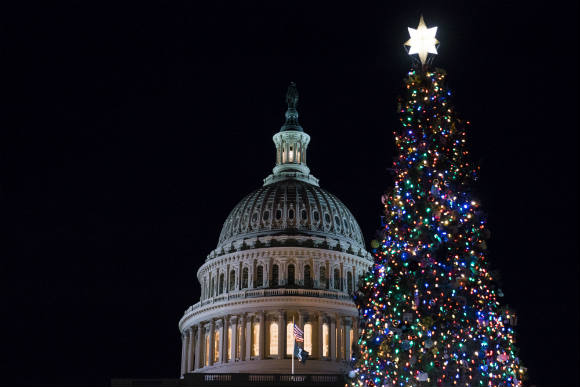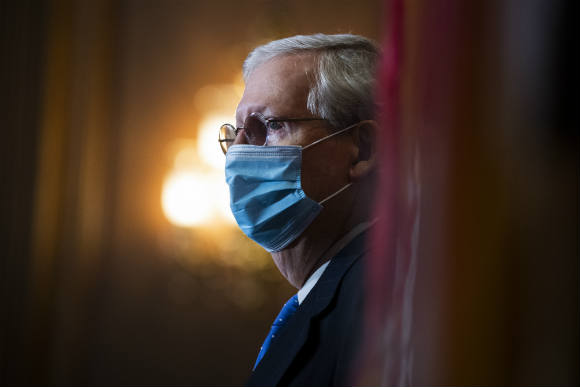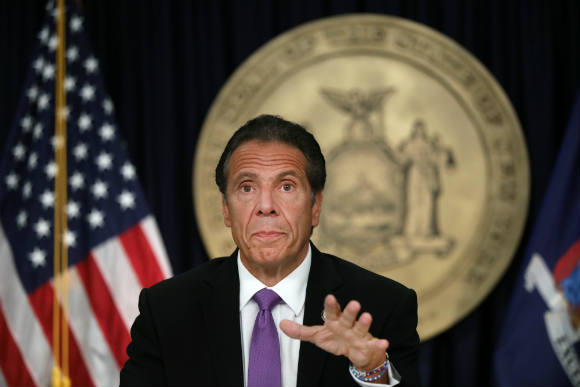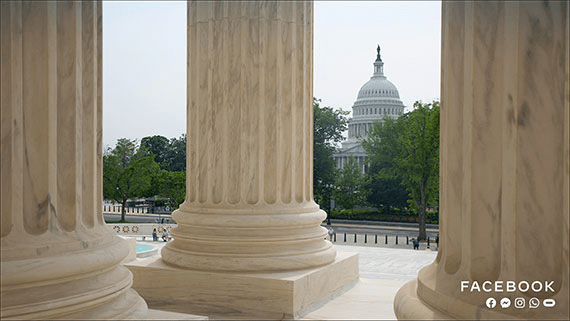The Hill’s Morning Report – Presented by Facebook – Congress faces end-of-year crunch; Biden selects his Defense secretary

Presented by Facebook

Welcome to The Hill’s Morning Report. It is Tuesday! We get you up to speed on the most important developments in politics and policy, plus trends to watch. Alexis Simendinger and Al Weaver are the co-creators, and readers can find us on Twitter @asimendinger and @alweaver22. Please recommend the Morning Report to friends and let us know what you think. CLICK HERE to subscribe!
Total U.S. coronavirus deaths reported each morning this week: Monday, 282,312; Tuesday, 283,743.
Congress is facing a crucial stretch ahead of the Christmas holiday to get multiple big-ticket items resolved, headlined by a potential dual agreement on a government funding package and a long-awaited coronavirus relief deal to wrap up the 116th Congress.
The House on Wednesday is expected to approve a one-week stopgap bill to keep the government lights on for another week as negotiators motor toward what they hope will be agreements to fund the government for fiscal 2021 and finance economic needs created by the pandemic (The Hill). The latter goal has remained elusive since July.
As The Hill’s Jordain Carney and Cristina Marcos write, lawmakers involved in discussions say that progress is being made on both fronts though it may take until days before Christmas to complete end-of-the-year business, and a government spending deal remains more likely to get done in some form. Senate Majority Leader Mitch McConnell (R-Ky.) said on Monday that a lot still has to happen to get a relief deal done with Democrats in less than two weeks.
“We have seen some hopeful signs of engagement from our Democratic colleagues, but we have no reason to think the underlying disagreements about policy are going to evaporate overnight,” McConnell said on the Senate floor. “We just need both sides to finally do what members of Congress do when they’re serious … drop the all-or-nothing tactics.”
The main focus is on a $908 billion proposal by a group of bipartisan lawmakers, which could be attached to the year-end spending bill next week. The group is expected to release the finalized text of the compromise legislation in the coming days, but it is still facing hurdles. Neither the White House nor GOP leadership has thrown its weight behind the proposal yet. However, White House economic adviser Larry Kudlow said on Monday that President Trump would “likely” sign it, though he said it depends on the details.
The Associated Press: Virus talks drag on liability as Congress preps stopgap aid.
The Washington Post: Congress to seek one-week government funding bill as stimulus negotiations continue.
Alexander Bolton, The Hill: Sen. Richard Durbin (D-Ill.) leads opposition to COVID-19 liability shield with eye on Senate Judiciary post.
CNBC: Stock futures fall as traders weigh stimulus prospects and increasing COVID-19 cases.
It is also drawing the ire of some lawmakers on each side of the aisle. Some GOP lawmakers are vehemently against any bill including funds for state and local governments. Progressives, along with some Republicans, including Sen. Josh Hawley (R-Mo.), have called for any bill to also include a second round of stimulus checks, with Hawley taking his plea directly to Trump in a phone call on Saturday night (The Hill).
“I’m continuing to be flummoxed as to why there aren’t any direct payments,” Hawley told reporters on Monday. “Everybody supported this in March. It’s the most useful, helpful and frankly popular aspect. So I told him that, and … I encouraged him to veto it.”
The Hill: Sen. Elizabeth Warren (D-Mass.) signals concerns about bipartisan coronavirus framework.
The Hill: Bipartisan group seizes spotlight, and more clout.
> “Big vote”: Another issue facing lawmakers in the coming days is the annual National Defense Authorization Act. Congress is in a staring match with Trump over a veto threat. As The Hill’s Rebecca Kheel writes, the House is poised to take up the bipartisan defense bill on Tuesday, and the Senate would follow.
Both chambers are expected to have strong bipartisan votes on the bill, even as Trump has repeatedly threatened to veto it over the lack of language to repeal Section 230, which gives legal protections to tech companies, and provisions to rename military bases and installations that are named after Confederate figures. It remains an open question whether Trump would follow through with a veto threat if the bill passes with more than two-thirds of each chamber, representing a veto-proof majority.
House Majority Leader Steny Hoyer (D-Md.) has indicated that the House will likely have the votes to override a veto, which would be the first of the Trump administration. McConnell said on Monday that the upper chamber will plow forward with a vote on the bill despite Trump’s threats, with top Senate Republicans predicting it will pass with flying colors. The Senate’s initial defense bill passed with 86 votes, and it remains to be seen how the Senate GOP would react to a veto (The Hill).
“I just think it’s going to be a big vote,” Senate Majority Whip John Thune (R-S.D.) said.
The Hill: Rep. Rosa DeLauro (D-Conn.) intends to be “strong chair” as Appropriations leader.

A MESSAGE FROM FACEBOOK
Facebook supports updated internet regulations
We support updated internet regulations to set clear rules for today’s toughest challenges and hold companies, including Facebook, accountable for:
— Combating foreign election interference
— Protecting people’s privacy
— Enabling safe and easy data portability between platforms
LEADING THE DAY
CORONAVIRUS: The first doses in England of a widely researched and tested COVID-19 vaccine went today to senior citizens Margaret Keenan, who will be 91 next week (pictured below), and William Shakespeare, 81, as part of a vaccine distribution program the United Kingdom calls “V-Day.” The first 800,000 doses are going to U.K. residents older than 80 who are either hospitalized or already have outpatient appointments scheduled, along with nursing home workers. Great Britain is getting a head start on the project after regulators there gave emergency authorization to the vaccine produced by U.S. drugmaker Pfizer and Germany’s BioNTech on Dec. 2 (The Associated Press).

In Washington today, Trump plans to sign an executive order instructing the Department of Health and Human Services (HHS) “to ensure the United States government prioritizes getting the vaccine to American citizens before sending it to other nations” (The New York Times). No health provider can administer a vaccine without being enrolled in an HHS tracking system, which will provide a daily record of how many people in the country have been vaccinated against the coronavirus (Bloomberg News).
It is unclear what HHS authority Trump can use to dictate how states and private health care providers resolve questions about who first receives limited COVID-19 vaccine doses; the administration early this year turned to states and localities to determine pandemic responses. The Centers for Disease Control and Prevention has issued non binding vaccine guidance. The administration through the CDC is requiring states to submit names, birth dates, addresses and ethnicities of COVID-19 vaccine recipients. State officials worry the vaccine registry could be misused (The Washington Post).
The U.S. military is involved in helping to pre-position vaccine doses at 64 distribution sites in states and territories, but military personnel are not going to administer coronavirus inoculations to members of the general public. In fact, public health officials have warned that any such move could dissuade too many people from voluntarily getting inoculated when vaccines are approved for use.
Charles Blow, The New York Times opinion columnist: How Black people learned not to trust. Concerns about vaccination are unfortunate, but they have historical roots.
Pfizer CEO Albert Bourla and Moderna CEO Stéphane Bancel declined invitations to participate in Trump’s “vaccine summit” today. They lead two of the major drug manufacturing companies eager to receive emergency approval for COVID-19 vaccines from the Food and Drug Administration, perhaps within days (STAT News).
The New York Times reports that late in the summer, the Trump administration declined to purchase from Pfizer additional doses of its COVID-19 vaccine, then in experimental trials. Now Pfizer may not be able to provide more of its vaccine to the United States until June because of its commitments to other countries. In July, the administration announced it invested nearly $2 billion under contract with Pfizer and German biotechnology company BioNTech for 100 million doses of COVID-19 vaccine by this month, which would inoculate 50 million people under a two-dose regimen (The New York Times).
The United States invested in more than half a dozen such vaccine efforts as part of Operation Warp Speed, hoping to build manufacturing ability for an eventual breakthrough. The U.S. contract with Pfizer says the government does not pay the nearly $2 billion until the drug is approved and the first 100 million doses are delivered.
In November, Pfizer cut its 2020 projection from 100 million to 50 million doses, but it remains on track to produce 1.3 billion doses of the vaccine in 2021, The Washington Post reported. The Trump administration says “scalability” of manufacture is now an issue for the company (The Washington Post).
HHS Secretary Alex Azar told NBC News on Monday that “with Pfizer, we have an option to buy an additional 500 million more [doses].” He declined to be more specific and did not say how rapidly additional doses could be available.
The Associated Press: Years of research laid groundwork for speedy COVID-19 shots.
The Washington Post: In their own words, read what seven ICU nurses want America to know about the battle against COVID-19 after caring for the sickest patients for almost a year. “Going out into the community is scarier than coming into work every day. Because you don’t know who has it.” … “I’m actually scared, and I’ve never been scared at work before. I am scared that we will lose control.” … “I find it very frustrating when I go out and about on my days off and I see people very blatantly not wearing masks or trying to tell me how come they don’t work or telling me that this pandemic isn’t real. I find it completely disrespectful to the work we do to save people’s lives, to have people think that this pandemic isn’t real, to show utter disregard for people around them.”
Economic competition to get in line for categories of the population that can receive vaccinations following distribution to at-risk health care workers and nursing home residents has industry leaders making their case to state-level agencies to get their workers near the front of the line (The Hill).
State Watch: New York will soon shut down indoor dining in New York City and further restrict capacity at restaurants in the rest of the state if COVID-19 hospitalizations don’t stabilize in the next five days. And if hospital capacity trends toward hitting critical levels in a particular region, that region will face a shutdown of non-essential businesses, Gov. Andrew Cuomo (D) warned on Monday (USA Today Network). … In Washington, D.C., Mayor Muriel Bowser (D) announced on Monday that some unemployed residents who are receiving Pandemic Unemployment Assistance will receive a single $1,200 stimulus payout (The Washington Post) and she suspended all high school sports and banned high-contact sports for adults at city parks and other locations (The Washington Post). … In Texas, Gov. Greg Abbott (R) said COVID-19 vaccination will not be mandatory for residents of his state (Fox 4 News). … Michigan Gov. Gretchen Whitmer (D) extended until Dec. 20 the state’s partial lockdown, which includes the suspension of some businesses, indoor dining, and in-person classes at the high school and collegiate levels (The Detroit News).

****
POLITICS: The president’s legal challenges continue to fail across the board in his attempt to swing the election in his favor. However, that has not stopped his most ardent supporters from following his lead and believing that the president-elect was not legitimately elected.
On Monday, Georgia recertified the November election results, handing President-elect Joe Biden the state and its 16 electoral votes by more than 11,000 ballots. In Michigan, a federal judge denied an effort by Republicans in the state to have the results decertified. But that has not slowed unrest among Trump supporters, with officials reporting threats against them and their families. Michigan Secretary of State Jocelyn Benson (D) revealed that dozens of armed protesters convened outside her home on Saturday night and chanted “unambiguous, loud and threatening” slogans as she was inside with her 4-year-old son.
As Niall Stanage explores in his latest Memo, scores of Trump supporters refuse to believe that Biden was duly elected. According to a recent Economist-YouGov poll, 80 percent of Republican voters said they believed Biden’s election win was not legitimate, with 60 percent of Republicans saying they had no level of confidence that the national election had been fair. Fourteen percent added that they had “only a little” confidence. Those results spell real trouble for the incoming Biden administration, experts say.
“A significant segment of the American electorate — certainly a vast majority of Republicans — believes that the election was stolen and that Biden is an illegitimate president,” said Larry Diamond, a senior fellow at the Hoover Institution at Stanford University. “That is going to make it more difficult for Biden to govern and more difficult for Republicans to cooperate with him.”
The Washington Post: Trump asks Pennsylvania House Speaker for help overturning election results, personally intervening in a third state.
CNBC: Trump loyalist Michael Pack plots final purge at federal media agency before Biden takes office.
The Hill: Secretary of State Mike Pompeo this week will deliver a foreign policy speech in Georgia ahead of the Senate runoffs.
> 2020, cont.: Women broke barriers in state legislature races across the country last month, with a record number of women from both parties winning their races at the state level, as The Hill’s Julia Manchester writes.
According to the Center for American Women in Politics at Rutgers University, at least 1,684 women will serve as state representatives in 2021. That’s up from the previous record of 1,641. At the state Senate level, a minimum of 552 women will serve as state senators in 2021, besting the prior record of 521.
The Washington Post: GOP women’s record-breaking success reflects party’s major shift on recruiting and supporting female candidates.
IN FOCUS/SHARP TAKES
NEW ADMINISTRATION: Biden is ready to announce that retired Gen. Lloyd Austin is his choice to be Defense secretary (Politico). If confirmed by the Senate, Austin, 67, who retired in 2016, would make history as the first Black appointee to lead the department (The New York Times and The Hill). He is known as a battlefield commander, not a politician.
The president-elect will introduce members of his health care team today in Wilmington, Del., and could introduce Austin for the Pentagon role as early as today.
Biden has been lobbied by progressives, members of Congress, and former military officials, and Democrats who specifically wanted to see a Black nominee in a top Cabinet post. Politico reported that some national security experts noted that Austin has not been out of the military for the required seven years and would need a waiver from Congress to lead the Pentagon. He would be the second Defense secretary in four years to require such a waiver, after Trump chose James Mattis, another former Central Command chief, for the role in 2017.
Also possible this week: Biden’s choice for attorney general (CNN).
Biden’s transition team in a Monday night statement said the president-elect will unveil additional nominees “before Christmas, including his nominee for Secretary of Defense and members of his economic and domestic cabinet before the end of this week.”
Early Monday morning, Biden made it official that California Attorney General Xavier Becerra will be his nominee to lead the Health and Human Services Department. The Hill’s Peter Sullivan reports what a former House member and lawyer who helped lead the legal battle to defend the Affordable Care Act could bring to the role in 2021.
To serve as Agriculture secretary, the chatter about Biden’s short-list on Monday swirled around a man who already had the job for eight years during the Obama administration, Tom Vilsack. Another name: former Michigan Attorney General and two-term Gov. Jennifer Granholm (D), who was a CNN political contributor during the 2020 election and is reportedly in the mix for multiple posts (Politico).
The Morning Report is created by journalists Alexis Simendinger and Al Weaver. We want to hear from you! Email: asimendinger@digital-staging.thehill.com and aweaver@digital-staging.thehill.com. We invite you to share The Hill’s reporting and newsletters, and encourage others to SUBSCRIBE!
OPINION
A general shouldn’t lead the defense department, by Jim Golby, opinion contributor, The New York Times. https://nyti.ms/3lTYQnQ
Georgia Senate battle is a high-stakes poker game, by Brad Bannon, opinion contributor, The Hill. https://bit.ly/37GpZFK
A MESSAGE FROM FACEBOOK
It’s time for updated regulations to improve privacy standards
We continue to take action to build privacy into our products and give people the tools to help manage their privacy like Privacy Checkup and Off-Facebook Activity.
But there’s more to do. We support updated internet regulations to improve privacy standards.
WHERE AND WHEN
The House meets at noon for legislative business.
The Senate at 10 a.m. will resume consideration of the nomination of Nathan Simington to be a member of the Federal Communications Commission.
The president will make remarks about COVID-19 vaccine progress during an Operation Warp Speed event at 2 p.m.
Vice President Pence will participate in the vaccine event.
Biden and Vice President-elect Kamala Harris will separately review the President’s Daily Brief and then introduce nominees and appointees to the incoming administration’s health team (previously announced). They also plan to hold a virtual meeting with civil rights leaders.
INVITATION: The Hill Virtually Live on Thursday at 1 p.m. hosts “Doing Better in America.” As COVID-19 cases continue to surge, Americans are being forced to innovate. Across the nation, small-business owners and educators are leveraging new and creative ways of thinking to stay afloat in tough times. Among those joining the discussion will be Rep. Steve Chabot (R-Ohio), ranking member of the House Small Business Committee, and American Federation of Teachers President Randi Weingarten. RSVP HERE.
The Bipartisan Policy Center continues its Solutions Summit: Blueprint to Restore Economic Security for Working Families with webinars this week focused on potential bipartisan solutions to effective governance. Discussions take place at 2 p.m. featuring national, state and local officials. Registration is HERE.
Hill.TV’s “Rising” program features news and interviews at http://digital-staging.thehill.com/hilltv or on YouTube at 10:30 a.m. EST at Rising on YouTube.
ELSEWHERE
➔ U.S. vs. CHINA: The Trump administration on Monday imposed sanctions against 14 Chinese officials who are members of China’s National People’s Congress over Beijing’s disqualification of elected opposition legislators in Hong Kong (Reuters).
➔ THE RIGHT STUFF: Chuck Yeager, a former Air Force officer who became the first pilot to break the speed of sound, died on Monday. He was 97. The history-making pilot who flew the experimental Bell XS-1 (later X-1) rocket plane over Muroc Dry Lake in California helped “set our nation’s dreams soaring into the jet age and the space age,” NASA Administrator Jim Bridenstine said. Yeager went on to command fighter squadrons in Germany and Southeast Asia during the Vietnam War and was promoted to brigadier general in 1969. He retired on March 1, 1975. “What really strikes me looking over all those years is how lucky I was, how lucky, for example, to have been born in 1923 and not 1963 so that I came of age just as aviation itself was entering the modern era,” Yeager said in a 1985 speech at the Smithsonian Air and Space Museum. “I was just a lucky kid who caught the right ride” (NBC News).
➔ MONOLITHS: Tall, shiny metal objects that have popped up in the Utah desert, a California national park, Romania and downtown Las Vegas have been the subject of public fascination as their creators remain anonymous. In Atascadero, a California city of 30,000 people, guerilla artists who made a second monolith after their first creation was torn down and replaced by a cross have come forward to tell (and show) their story (The New York Times).
➔ PICTURES, FIRST: In its 133 years, National Geographic has never singled out a year for a photographic retrospective, but 2020 was different. The January issue includes 71 photos that show how this year tested, isolated and even empowered people and how they endured. Take a look HERE.
➔ MUSIC BUSINESS: The Universal Music Publishing Group on Monday announced that it struck a landmark deal with Bob Dylan to purchase his entire songwriting catalog in what may be the biggest acquisition ever of the music publishing rights of a single act. The price was not disclosed but is estimated at more than $300 million. Dylan, 79, had no comment. The deal is the latest and most high-profile in this year’s buzzing market for music catalogs, as artists both young and old have sold their songs, while publishers and investors have raised billions of dollars from both public and private sources to close those deals (The New York Times).

THE CLOSER
And finally … Panda Watch at the National Zoo will last for only three more years, as all three giant pandas will return to China in 2023 as part of a new agreement with Chinese officials.
The three-year extension means that Mei Xiang, a female, and Tian Tian, a male, who have been National Zoo celebrities for two decades, will return to China on Dec. 7, 2023, with Xiao Qi Ji, their 4-month-old cub, joining them.
The news means that the National Zoo could be panda less starting then, although zoo officials are hopeful China will send more pandas in the future (The Washington Post).

Copyright 2024 Nexstar Media Inc. All rights reserved. This material may not be published, broadcast, rewritten, or redistributed..









